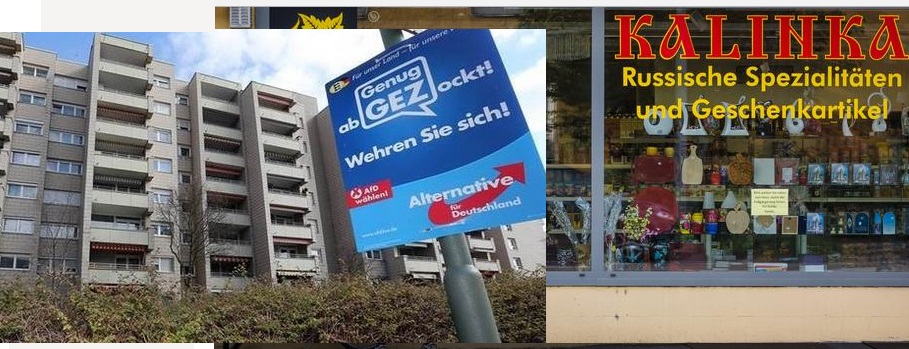In the media, Pforzheim-Heidach is constantly cited as an example where the AfD have attracted “too many” votes. They have been distributing flyers in Russian to Russian German communities, but other parties have also done so.
And Russian Germans who vote for the AfD even fear that they could lose state or private subsidies if it becomes apparent that they are closely linked to the AfD.
Six of the AfD’s candidates for the Bundestag come from the former Soviet Union, and five of them are Russian Germans. Ethnic Germans from Russia in general feel they are disadvantaged, compared to the help given to migrants.
There was no “welcome culture” when Russian Germans came to Germany and no persistent flowery official narrative supported them, although they were granted citizenship.
Igor Wenzel, chairman of the ethnic Russian German forum in Essen, told Deutsche Welle: “The special integration programs for repatriated ethnic Russian Germans have been scaled back considerably. In many places it was too early in my opinion, because the process of integrating Russian Germans has not yet been completed.”
Wenzel said the ethnic community is being singled out as Putin’s “fifth column” in the media. “We definitely see quite biased coverage. That is unacceptable. You cannot portray people as populists or Putin supporters based on their ethnicity.”
Although German mainstream media had announced the end of the anti-immigration party, the AfD looks set to enter Germany’s parliament for the first time in September’s election. As recently as in February, DW reported that the “party is struggling for cohesion after public opinion surveys suggested its support is eroding”, but their “end” had obviously been announced prematurely.
The AfD stronghold of Pasewalk, is an example of how Russian Germans are being pushed out. “A lot of foreigners, aren’t there?” Ivonne Dittmann told DW. She lives in Pasewalk’s “Oststadt” estate where there are currently migrants being housed. “They get more than us. Us Germans.”
She added that the AfD was the only party to address the migrant issue. “I think they’ll do more than the other parties, than the Social Democrats (SPD),” Ivonne said. “Merkel does nothing. Just makes up a few cool catchphrases.”
Jürgen Strohschein won the Mecklenburg-Western Pomerania’s 2016 state election for the AfD with a huge 20.8 percent of the votes. Strohschein balloted on top in the constituency of Vorpommern-Greifswald V. The 70-year-old had served as a member of Chancellor Angela Merkel’s Christian Democrats (CDU) for at least 42 years after becoming disillusioned with her party’s welcoming culture for migrants.
“Mrs Merkel was our best election aid, and that’s worked out,” Strohschein told DW. At 12 percent, the unemployment rate in Pasewalk is more than twice the country’s national average. They are often called “Wende-Verlierer,” the “losers of German reunification”. Yet the mainstream media regularly smear AfD supporters as belonging to an “extremist fringe”.
With the AfD currently polling at 9 percent nationwide, it certainly looks set enter into parliament, with more votes than the required threshold of 5 percent, making them the first pro-German ethno-cultural party to enter the German parliament since the end of World War II.
The party has emphasized the primacy of the German language, traditional German culture and rejects the idea that Islam is part of German society.
The AfD wants the EU’s borders to be sealed, institute identity checks along national borders and set up holding camps abroad to prevent migrants from entering Germany in the first place.
Anyone whose application for political asylum has been rejected should be deported they say and foreigners should be encouraged financially to return to their home countries. The AfD believes that any migrants who are allowed to remain in Germany have a duty to fully integrate into German society.
The party’s first major electoral success was when it polled 7.1 percent of the vote in the 2014 European Parliamentary election.
At its formation in 2013, the AfD’s main thrust was its opposition to bail-outs of indebted European Union member states by German taxpayers. Its leader, Bernd Lucke, called the AfD a “new type of party that was neither right- nor left-wing”.
















